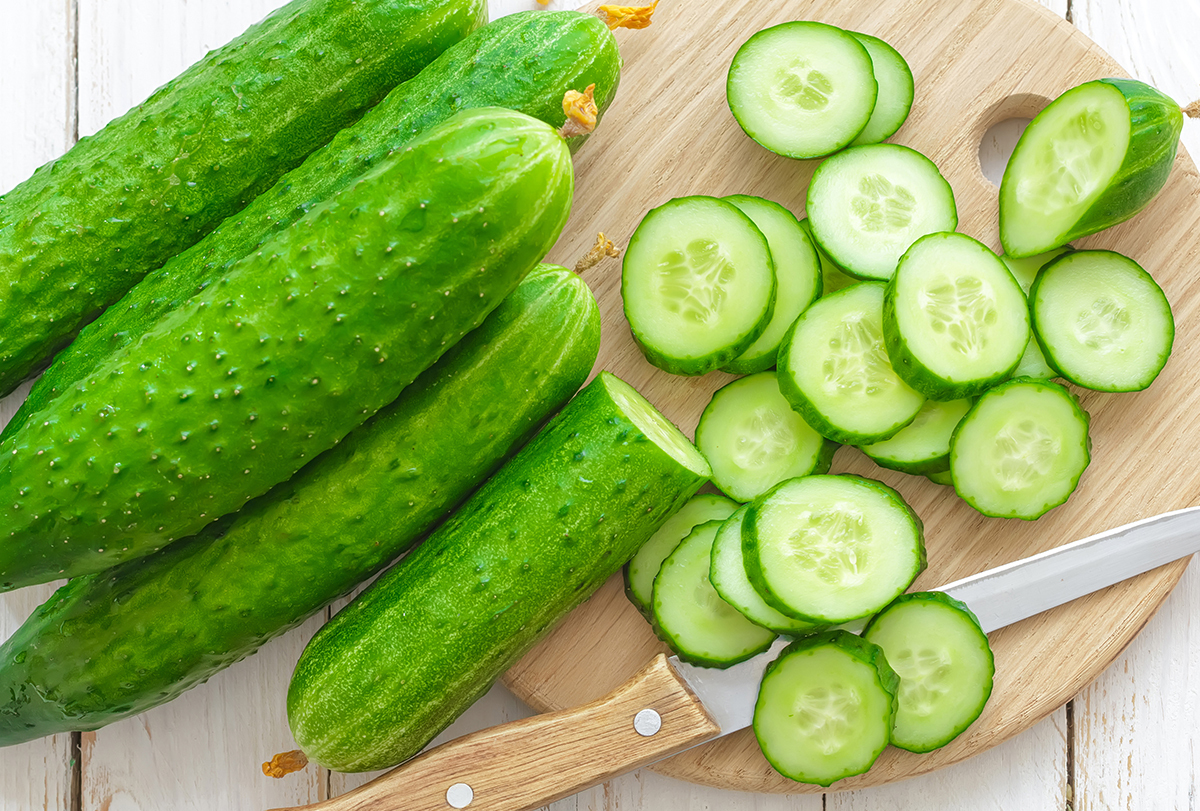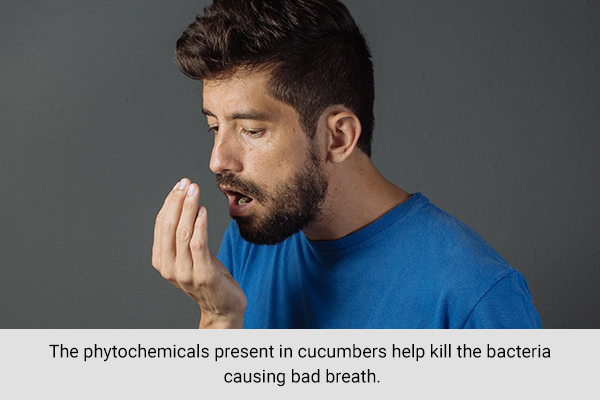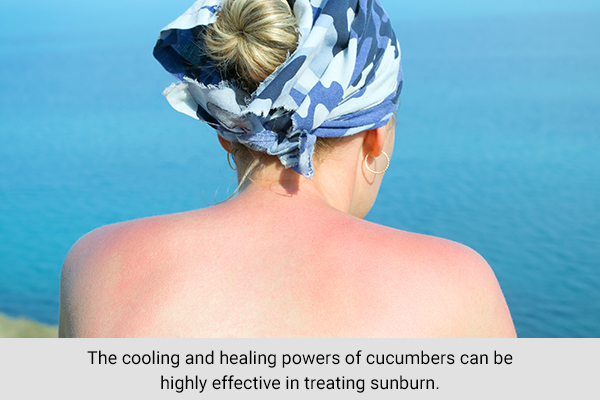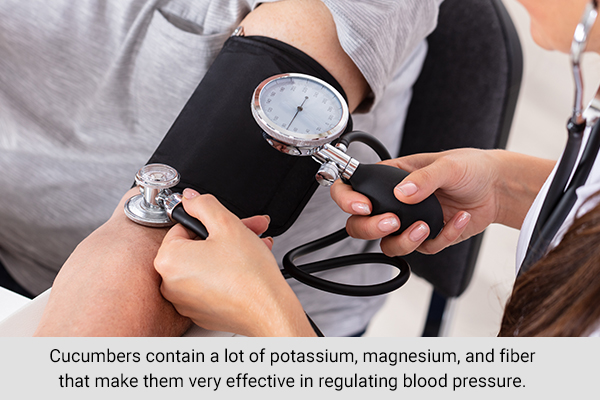In this article:
Although commonly perceived, prepared, and eaten as a vegetable, cucumber is in fact technically a fruit belonging to the Cucurbitaceae family of plants, which also includes squash, pumpkins, and melons.

Much like its siblings, cucumber also has an overwhelming water content of about 95 percent. Now you know where the phrase “cool as a cucumber” comes from and why this thirst-quenching fruit figures among the top summer treat for people all over the world.
Even though there are hundreds of varieties of cucumbers, the ones fit to eat are either eaten fresh or pickled. Cucumbers intended to be sliced and eaten fresh are usually larger and thicker skinned than those that go straight into the brine jar for pickling.
How Cucumber Is Beneficial to Your Health
Here are some reasons why you should eat more cucumbers.
1. Hydrates the body

Cucumbers are about 95 percent water. Hence, consuming them is an ideal way to meet your fluid needs through your diet.
This extra dose of hydration is a welcome respite particularly during the draining summer months and even helps to normalize your body temperature. Moreover, cucumbers are a good source of vitamins A and C, folic acid, and fiber, which help eliminate harmful toxins from the body. (1)
On dry, hot summer days, munch on cool cucumbers several times a day. You can also make a rejuvenating drink by mixing mint and lemon juice in a glass of freshly extracted cucumber juice.
2. Treats puffy eyes
The ascorbic acid in cucumbers decreases water retention, in turn diminishing the puffiness and swelling under the eyes. (1) Plus, the enzymes and astringent properties in cucumbers help reduce inflammation.
How to use:
- Cut a cucumber into thick slices and chill them in the refrigerator.
- Place one cucumber slice over each eye for 10 minutes.
- Then, wash the area with lukewarm water.
- Use this treatment two or three times daily for a week to notice changes.
You can also use cucumbers to get rid of wrinkles around your eyes and reduce the appearance of dark circles.
3. Controls bad breath

Cucumbers can also freshen your breath. The phytochemicals present in cucumbers help kill the bacteria causing bad breath. (2)
Also, chewing a crunchy slice of cucumber helps stimulate the production of saliva in the mouth, in turn washing away odor-causing bacteria.
Also, when you eat a crunchy cucumber, it removes the plaque accumulated on your teeth and gums that these stinky culprits feed on. Cucumbers also help reduce excess heat in your stomach, another cause of foul breath.
One of the simplest ways to eliminate bad breath is to put a slice of cucumber in your mouth and hold it against the roof of your mouth with your tongue for a few seconds.
4. Aids in digestion
The high water content and dietary fibers in cucumbers work together to get rid of harmful toxins from the digestive system and aid in its functioning. (1)(3)
Many digestive disorders, such as acidity, constipation, heartburn, gastritis, and even ulcers, can be easily treated at home by drinking a glass of cucumber juice daily.
On top of that, pickled cucumbers contain healthy strands of probiotic bacteria that aid the growth of favorable gut flora and promote a smoother digestion process.
5. Heals sunburn

The cooling and healing powers of cucumbers can be highly effective in treating sunburn. Cucumbers are full of skin-lavishing minerals, including magnesium, potassium, and silicon, which explains why they are a regular ingredient in commercial products for sunburn treatment.
Cucumbers also work to rejuvenate the skin and improve its complexion. They can even be used to fade scars and lighten pigmentation. (4)
If you have a sunburn, cucumbers will help draw heat out of your skin and speed up the healing process.
How to use:
- Blend one cucumber and apply the paste on the affected skin.
- Allow it to dry on its own.
- Then, take a cool shower.
- Follow this treatment once daily for a few days.
6. Lowers blood sugar
Cucumbers are naturally a diabetes-diet-friendly food as they have low calories and high fiber content. Moreover, cucumbers may help lower blood sugar as they contain a hormone that is required by beta cells for insulin production.
A study published in the Iranian Journal of Basic Medical Sciences expounded upon this antidiabetic effect of cucumbers by demonstrating that a nine-day diet of cucumber seed extract helped reduce sugar levels in diabetic rats. (5)
Another animal study published in the October 2014 issue of the Journal of Medicinal Plant Research demonstrated that cucumber pulp extract lowered blood sugar. This study isolated chemicals from the cucumber that have previously been linked to blood-sugar-lowering properties. (6)
Although further studies are needed to establish and elaborate upon the sugar-lowering efficacy of cucumbers for humans, it wouldn’t hurt to add this low-calorie succulent snack to your diet nevertheless!
7. Regulates blood pressure

Cucumbers contain a lot of potassium, magnesium, and fiber that make them very effective in regulating blood pressure. They are considered good for the treatment of both low and high blood pressure. Plus, being a natural diuretic, cucumbers help to hydrate and lower the pressure in the arteries. (7)
Several studies done by DASH (Dietary Approaches to Stop Hypertension) found that eating cucumbers, coupled with a low-starch and lean protein diet, helped lower blood pressure by 5.5 points in people suffering from hypertension.
To lower blood pressure, cucumber juice should be mixed with other vegetable juices, such as those from carrots, beets, and lemons. Drinking this juice two or three times a day has been found to bring down elevated blood pressure in a matter of days.
8. Prevents hangovers
If drinking alcohol gives you a headache the next morning, cucumbers (and time) may solve your problem.
Nutrients including B vitamins, sugar, and electrolytes, and the high-water content present in cucumbers help replenish the essential nutrients lost through alcohol consumption and prevent dehydration. This, in turn, reduces the intensity of hangovers. (1)(3)
To help prevent a hangover, eat a few slices of cucumber, including the skin, before going to bed after you have been drinking.
9. Fights cancer
Another beneficial property of cucumbers is their ability to fight and prevent cancer. Some of the components in cucumbers that have anticancer activities are cucurbitacins, fisetin, lutein, and caffeic acid. (8)(1)
The bitterness in cucumbers is caused by a class of phytochemicals known as cucurbitacins, which have strong anticancer properties that inhibit cancer cell growth. Plus, the flavonoid fisetin can effectively reduce the viability of prostate cancer cells.
Caffeic acid has antiproliferative and apoptotic effects on breast cancer cells. Lignans, on the other hand, get converted into compounds, such as enterodiol and enterolactone, by bacteria in the body that mitigate the risk of estrogen-related cancers, such as ovarian, breast, endometrial, and prostate cancers.
Additionally, the many antioxidants in cucumbers along with vitamin C improve your immunity and reduce free-radical damage, which in turn helps prevent cancer.
Nutritional Content of Cucumber
Cucumbers are an excellent source of vitamins K and C and different B vitamins. They are also a good source of sodium, copper, amino acids, carbohydrates, sugar, soluble and insoluble fibers, potassium, manganese, fatty acids, phosphorus, magnesium, biotin, and silica.
Plus, cucumbers have many health-supportive phytonutrients, including flavonoids (apigenin, luteolin, quercetin, and kaempferol), lignans (pinoresinol, lariciresinol, and secoisolariciresinol) and triterpenes (cucurbitacins A, B, C, and D). (3)
Nutritional value of raw cucumber per 100 grams:
| Nutrient | Quantity | Amount |
|---|---|---|
| Water | g | 95.23 |
| Energy | kcal | 15 |
| Protein | g | 0.65 |
| Total lipid | g | 0.11 |
| Carbohydrate | g | 3.63 |
| Fiber | g | 0.5 |
| Sugars | g | 1.65 |
| Calcium, Ca | mg | 16 |
| Iron, Fe | mg | 0.28 |
| Magnesium, Mg | mg | 13 |
| Phosphorus, P | mg | 24 |
| Potassium, K | mg | 147 |
| Sodium, Na | mg | 2 |
| Zinc, Zn | mg | 0.2 |
| Vitamin C | mg | 2.8 |
| Folate | mcg | 7 |
| Vitamin A | mcg | 5 |
| Vitamin K | mcg | 16.4 |
Much of this nutritional goodness is concentrated in the peel and seeds of cucumbers, which are particularly replete with essential minerals, fiber, and beta-carotene antioxidants.
Final Word
Cucumbers make for a healthy addition to any diet because they are low in calories and fat while being impressively nutrient-rich. (1) You can have them raw, juice them or add them to your salads, sandwiches, refreshing beverages, dips, or chilled veggie side dishes to give your health a boost!
When buying fresh cucumbers, it may be a good idea to look for firm and dark-green batches. Organic cucumbers are the preferred choice because of their enhanced taste and high nutrient content.
- Was this article helpful?
- YES, THANKS!NOT REALLY


